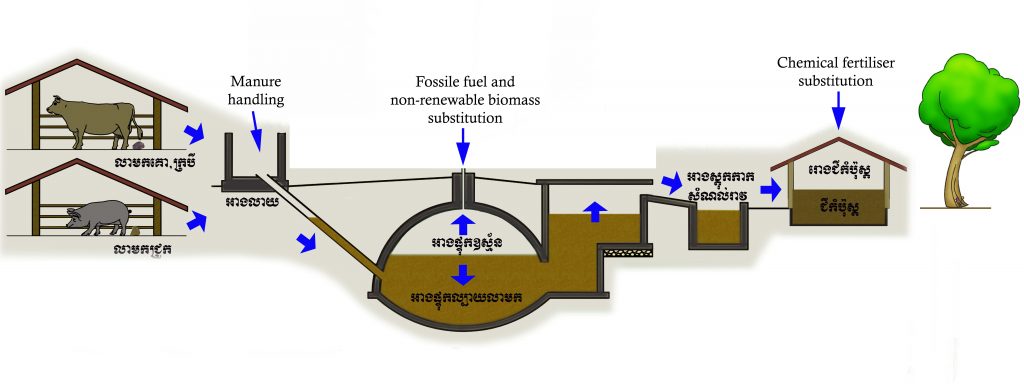Transforming waste into biogas in Cambodia
Context
Over 85% of the rural population in Cambodia lacks access to electricity, as reported by the World Bank in 2017, creating significant barriers to modern living standards and economic development. Improving access to electricity and clean cooking not only enhances quality of life and health but also offers substantial climate benefits. By reducing the reliance on biomass and fossil fuels for cooking, these improvements can lower greenhouse gas emissions and mitigate deforestation, contributing to global efforts to combat climate change while contributing to sustainable development in Cambodia’s rural communities.
Project
The Biodigester Program was designed to address the gaps in access to electricity, whilst also providing local jobs, a reduction of GHG emissions and a number of other benefits for rural household users.
Benefits for users are significant and far-ranging from cost and time savings on acquiring fossil fuels, to reduced impact on forested areas; from health improvements of users no longer exposed to smoke from cooking to reduced need for chemical fertilisers due to the bioslurry made available by the biodigester.
Biogas is a clean energy source produced from livestock and agricultural waste. The program aims to disseminate different types of biodigesters and establish a thriving domestic biodigester sector based on a market-driven approach for sustainable energy in Cambodia. The most widely used model is the fixed dome digester buried under the ground.

The biodigester converts animal manure into clean biogas and organic fertiliser, providing a way for individual households to reduce their dependence on polluting fuels for cooking and lighting.
This clean energy generates time and money savings for users while reducing deforestation and greenhouse gas emissions. It also creates a smoke-free cooking environment, producing a positive impact on respiratory health, especially for women and children.
The organic fertiliser generated from the system also reduces how much farmers spend on chemical fertiliser while improving crop yield leading to greater produce income.
The program operates in 14 provinces with 27,000+ biodigesters built benefiting 153,000+ direct users.
Verification
This project is verified by the Gold Standard. You can view it on the Gold Standard registry here.

Climate Solution
Methane digesters
One option is to control decomposition of organic waste in sealed tanks called anaerobic digesters. They harness the power of microbes to transform scraps and sludge and produce two main products: biogas, an energy source, and solids called digestate, a nutrient-rich fertilizer. The digestion process unfolds continuously, so long as feedstock supplies are sustained and the microorganisms remain happy.
When produced at scale, biogas can displace dirty fossil fuels for heating and electricity generation.
Photos
UN Sustainable Development Goals
The 'Transforming waste into biogas in Cambodia' project aligns with the following UN Sustainable Development Goals:

Rethink how we grow, share and consume our food. We can provide nutritious food for all.

Ensure access to affordable, reliable, sustainable and modern energy.

Take urgent action to combat climate change and its impacts.
Read more about the Sustainable Development Goals
